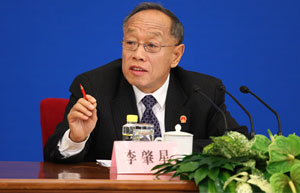Regional officials considering changes to population policy
By Shan Juan (China Daily)
Updated: 2011-03-10 07:38
Beijing - High-ranking regional officials have confirmed for the first time that they are mulling over making an adjustment to China's 30-year-old family planning policy, which encourages families to have only one child.
Even so, population authorities in the central government are declining to say whether they will make a similar call for relaxation.
| ||||
The current policy allows urban couples in which both the husband and wife are only children to have a second child. The one exception to this rule applies in the densely populated Henan province, where all couples are still strictly encouraged to limit themselves to a single progeny. Rural couples all over the country, meanwhile, may have a second child if their first is a girl.
Regional officials are thinking seriously about making adjustments, Yao Mingbao, secretary-general of the Standing Committee of the Shanghai People's Congress, told China Daily on Monday. Even so, Yao declined to furnish details about a timetable and other matters, saying much must still be decided by the central government.
Shanghai's fertility rate of 0.8 is among the lowest in the world, according to official statistics. In most industrial countries, a fertility rate of 2.1 is needed to replace the population over time.
The average fertility rates in Beijing and Heilongjiang province have also fallen below 1. China has maintained a low fertility rate of 1.8 for almost 13 years.
The family planning policy is credited for preventing 400 million births in the mainland and helping fuel China's economic growth and improve citizens' livelihoods. Meanwhile, it gave rise to a set of new difficulties, including a population that is growing older on average, a skewed sex ratio and a dwindling labor supply.
Premier Wen Jiabao said in his work report on Saturday: "We'll progressively improve the basic State policy on family planning and promote balanced population growth."
"It's the first time the top leadership has announced in public plans to improve the policy," said Yuan Xin, a professor with Tianjin-based Nankai University's population and development institute, also a program expert for the National Population and Family Planning Commission.
"The reference in this year's government work report is a positive signal by the top leadership to local governments, which are searching for ways to fine-tune the family planning policy based on their own conditions," Yuan said.
Proposals to improve the family planning policy have been the subjects of much debate among the National People's Congress (NPC) deputies and Chinese People's Political Consultative Conference (CPPCC) National Committee members attending the annual sessions in Beijing.
Zhao Suping, an NPC deputy from Henan province, said more incentives should be used to benefit those who abided by the family planning policy.
Zhao said family planning assistance should be extended not only to rural families but to low-income families in cities and more care should be offered to elderly couples with a single child.
Ji Baocheng, president of Renmin University of China, said now is the right time to allow urban couples throughout the country to have a second child, since "the goal of curbing fast population growth has long been met". As a member of CPPCC's national committee, he has put forth such a proposal four years in a row.
Zhao Bingli, former deputy director of the National Population and Family Planning Commission, had a different opinion.
"In fact, family planning policies have always been subject to change and there will never be a uniform one nationwide," he said, without ruling out the possibility that further adjustments will be forthcoming.
"It won't be as simple as adjusting the number of children allowed for each family but will involve systematic adjustments to the overall policies concerning population development," Zhao said.
Cheng Enfu, an NPC deputy and director of the Marxism Institute and Overseas Economics Research Center of Shanghai University of Finance and Economics, firmly objected to changes.
Relaxing the policy will result in a population increase, he said, saying that additional births will harm the public's quality of life.
Li Bin, minister of the National Population and Family Planning Commission, said in December that a change in population policies will have big consequences.
"We have to be highly cautious about that," she said.
Li Xing, Qian Yanfeng and Duan Yan contributed to this story.







